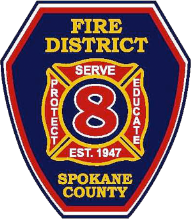Welcome to Spokane County Fire District 8
BURN RESTRICTIONS IN EFFECT
BURN RESTRICTIONS IN EFFECT
Providing a Full Range of Services
Spokane County Fire District 8 provides a full range of services that include fire suppression, emergency medical services, fire prevention, education and investigation, and associated support and maintenance services to our 23,917 citizens in a 110 square mile area in south Spokane County.
Smoke alarms don’t last forever—check the date and replace them every 10 years. #spokane_fd8_jaff_3711






